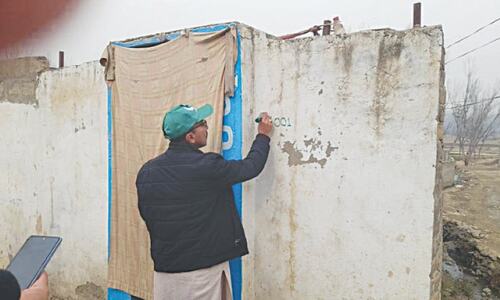ISLAMABAD, March 26: Taking strict notice of the March 11 violence-ridden strike in Karachi and other parts of Sindh, the Supreme Court on Saturday asked two provincial leaders of the People’s Party to explain why they should not be charged with committing contempt for allegedly ridiculing a court ruling and instigating people against it.
The contempt notices were issued against former senator and general secretary of the PPP’s Sindh chapter, Taj Haider, and the party’s provincial media coordinator, Sharjeel Inam Memon, under Article 204 of the Constitution relating to contempt of court and Section 3 of the Contempt of the Court Ordinance, 2003.
They were asked to appear before the Supreme Court on Friday. Composition of the bench will be announced later.
The notice asked Mr Memon also to explain to the court why he should not be disqualified as member of the provincial assembly for alleged utterances against the judiciary under the Constitution’s Article 63(1g) relating to disqualification for being convicted by a court or defaming or ridiculing the judiciary, and Article 113 relating to qualification or disqualification for assembly membership.
Notices have also been issued to Attorney General Maulvi Anwarul Haq, who under rules acts as a prosecutor in contempt matters, as well as to the advocate general of Sindh, Supreme Court Bar Association President Asma Jehangir and vice-chairman of the Sindh Bar Council.
In a reaction to the Supreme Court verdict of declaring the appointment of Justice (retd) Deedar Hussain Shah as chairman of the National Accountability Bureau (NAB) illegal, the PPP’s Sindh chapter had called for a strike that halted commercial and business activities in Karachi and other parts of the province.
As a result, according to media reports, seven people lost their lives in different incidents of violence.
Taking notice of the protest, the apex court wrote letters to the Sindh assembly secretary asking for a copy of a resolution passed by the provincial assembly condemning the ruling as well as to the Sindh chief secretary, inspector general of police, head of the Intelligence Bureau for Sindh and chairman of the Pakistan Electronic Media Regulatory Authority, with a direction to submit reports about measures taken by their respective offices to control the law and order situation on that day.
All these offices have submitted replies to the court, which include transcripts of statements of the two political leaders which, according to the Supreme Court notices, contained language which was “not appropriate and appeared to be contemptuous and scandalous bringing the judiciary and the court into hatred”.
The two PPP leaders will not be the first to face contempt of court charges since a similar contempt proceeding is also pending against Interior Minister Rehman Malik before the Supreme Court for appointing a joint investigation team to probe a Pakistan Steel Mills scam instead of an FIA officer, Tariq Khosa, proposed by the court.
Similarly, the apex court had also taken notice, though not on contempt grounds, of a statement last year of then information minister Qamar Zaman Kaira urging Chief Justice Iftikhar Muhammad Chaudhry to take suo motu notice of a newspaper report that claimed that Punjab Chief Minister Shahbaz Sharif had a secret meeting with the chief justice.
On Oct 2 last year, the Supreme Court, in a rare statement, had warned political leaders against impugning the impartiality of judges while commenting on court judgments and advised them to avoid unwarranted and uncalled for comments. The statement was issued after the court took notice of a controversial statement attributed to then labour and manpower minister Khurshid Ahmed Shah but cancelled by the government’s press information department.
Some superior court judges are also facing contempt charges for taking oath under the Provisional Constitution Order of Nov 3, 2007, issued by then president Pervez Musharraf.
Saturday’s court order quoted a statement of Taj Haider that legislators would take out a rally from the Sindh Assembly building to the Sindh High Court to lodge a protest against what was described as “politically-motivated decisions of the superior judiciary” and that there would be a general strike across Sindh against the “interference of the judiciary in administrative affairs”.
The order also quoted Mr Haider as saying that the judgment was discriminatory because another person was removed from the office because he was Sindhi.
Mr Memon was quoted in the notice as alleging that the courts had dual standards as they did not take any action against those who invaded the courts, which was a reference to the Nov 28, 1997, storming of the Supreme Court by PML-N supporters.
The notices required both the attorney general and Sindh advocate general to inform the court about actions taken to pay compensation to the heirs of the persons killed, murdered or injured and to those whose properties were damaged during the strike.














































Dear visitor, the comments section is undergoing an overhaul and will return soon.